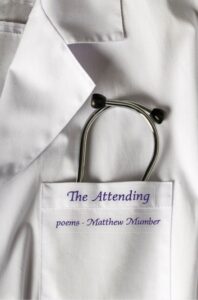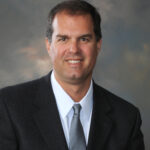Today’s special guest is poet Matthew Mumber to chat about his new chapbook, The Attending.

Bio:
Matthew Mumber, M.D., practices medicine as a board-certified radiation oncologist with the Harbin Clinic in Rome. After entering private practice, Matt attended and graduated from Dr. Andrew Weil’s fellowship in integrative medicine at the University of Arizona, where he met Rachel Remen and attended trainings on facilitation of physician-patient retreat groups through Commonweal. Subsequently, Matt attended and graduated from a 2-year program on spirituality at the Living School for Action and Contemplation through the Rohr Institute, where he studied with Jim Finley. An author of academic and lay press texts on the subject of healing, Matt has edited an academic textbook entitled Integrative Oncology: Principles and Practice and also co-wrote a lay-press health and wellness book, Sustainable Wellness with Heather Reed. He has served as the president of the Georgia Society of Clinical Oncology.
Matt’s poetry, which draws on his personal, professional, cultural and natural-world experiences, stems from his lectio divina meditation and spiritual practice. Matt has facilitated groups and retreats focused on transformation and healing for over twenty years. His first book of poetry, In the Awakening Season, was published in 2020. His second poetry collect, The Attending, will be published in 2023.
He lives in Georgia with his wife, Laura.
Welcome, Matthew. What do you enjoy most about writing poems?
It is a part of my spiritual practice. I enjoy opening myself up to that which is inspiring and then reflecting on it at depth. The foundation of that practice is awakening to a deeper experience of this present moment, in the midst of my concrete, daily life.
Moments of awakening tend to occur out of the blue for me. They are usually accompanied by an experiential realization that everything feels like a part of an oceanic oneness, including me. My periods of enlightenment tend to come and go in flashes. Rarely, these moments extend for hours to days and lead to a more extended period of transformation.
I try to put myself in the way of these spontaneous moments of spiritual experience by removing obstacles to their occurrence. Basically, I try to remain open to holding whatever comes up without trying to fix or judge it. Fixing and judging, clinging and resisting, tend to pull me into the past or project me further into the future where the lessons of the present are not available.
How can I be in this moment and allow this moment to inspire, surprise and move me?
One practice that has been especially helpful for me is Lectio Divina, specifically as taught by Jim Finley, a former Trappist monk who had Thomas Merton as his spiritual advisor in the monastery. I met Jim through the Living School for Action and Contemplation.
Can you give us a little insight into a few of your poems – perhaps a couple of your favorites?
From my first book – in the Awakening Season — “Resurrection” was written during my 2-year Living School studies as a way of understanding what Jesus meant when he said that you must die to be born again. Thomas Merton wrote that we must die to our false, separate sense of self in order to embrace our connected, true self. This poem is a meditation on this theme as it applies to every moment of my life.
From the upcoming second book – The Attending — “in a cloud of unknowing” was written as a mediation on the power of not knowing, and how that can bring me closer to beauty, wholeness and truth. It takes vulnerability, patience and practice to live in a space of not knowing. For me, this is the space where creativity initially flows through me into my poetry.
Also from The Attending – “October hike” has a dear place in my heart because it was written as a request by the wife of a patient of mine who had died. They hold a daily walk in that patient’s honor within a national forest that one of his family members donated. It is actually the largest protected forest within a city limit in the United states, The Marshall Forest. Robert and Mimi are dear friends and Robert embraced an integrative way of caring for himself and outlived expectations. The poem melds the experiences of life and death and reminds me that “all is living and all is dead”. Everything continues.
What form are you inspired to write in the most? Why?
I am drawn to a meditative lyrical form. I also like the form of the Italian Sonnet with a specific rhyme scheme and volta in the middle. I like to play with form based on the theme of the poem as it develops.

What type of project are you working on next?
I am working on my next compilation of poems, preliminary title — Allowing
When did you first consider yourself a writer / poet?
During my undergraduate studies at the University of Virginia, I took a couple of classes and poetry writing. When I wrote a problem about a classmate committing suicide in my catholic high school, I was asked to read it for community of writers in Charlottesville. I do not have the program anymore, but one line stands out in my memory, and after reading that line aloud on that day, I thought of myself as a writer. “I closed my eyes, and prayed real hard, to stop seeing the bullet tear your eyebrows apart.”
How do you research markets for your work, perhaps as some advice for not-yet-published poets?
I think it is important to lean into whatever community already exists for your work. Family, friends, colleagues–these have been most important to me. The Internet has opened up the world for everyone, however it is hard to be noticed in the wide, broad volume. Steady consistency and practice have been the most important for me. I am fortunate to be able to self publish my poetry books through the leap folio mechanism and this frees me up from constantly submitting for publication. This allows me time and energy to focus on improving my craft and deepening my practice.
What would you say is your interesting writing quirk?
I goes through periods of intense productivity and then several months where I just cannot imagine writing anything, followed by some surreptitious moment that begins the intense productivity again.
As a child, what did you want to be when you grew up?
I grew up in the Catholic school system and as I was growing up, the nuns always said that I should be either a priest or a doctor. Both roles appealed to me however when I began really contemplating what I wanted to be as a teenager, the idea of being a celibate priest was not an option. I had a wonderful pediatrician, Dr. Procopio, who was about half of my size. He had a very practical sense about him, and gave me a great deal of confidence in growth and becoming who I wanted to be. I finally committed to medicine when I realized that could practice medicine and address the whole person while providing scientifically sound care.
Anything additional you want to share with the readers?
One lesson that I am trying to constantly teach myself is that there is a big difference between accomplishing a goal based on fearing failure versus accomplishing the goal based on the desire to succeed. Either way, it is likely the goal will be accomplished, however with a desire to succeed it is a much more enjoyable and sustainable process.
